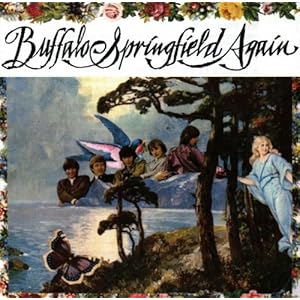Buffalo Springfield – Again

Again (1967)
A
1. Mr. Soul 2. A Child’s Claim To Fame 3. Everydays 4. Expecting To Fly 5. Bluebird 6. Hung Upside Down 7. Sad Memory 8. Good Time Boy 9. Rock & Roll Woman 10. Broken Arrow
Now that’s more like it, Neil. Plug it in and turn the motherfucker up. No more futzing about with go-go pop, trying to make Herman’s Hermits jealous. You guys are supposed to be the “American Rolling Stones,” aren’t ya? So why not go ahead and bash out the most gloriously rudimentary approximation of “Satisfaction” you can muster? That’s the kind of shit that’ll distinguish your Canadian ass from the rest of the pack and start you out on a nice 45-and-counting year career. “Mr. Soul” may be the very first Neil Young classic out of countless to come, but he was already demonstrating just what a quirky guy he was and is… he’s stone cold freaked out about the whole rock star thing already after no more than a few months on the scene! He expresses not just bafflement, but severe anxiety over the fact that he, of the stringy hair and wavering bird voice, could be “the event of the season.” That he could have fans – people he doesn’t even know who follow him and write him letters and for whom “just a trace of my face could seem so pleasing.” He knows his life will never be the same again, that he can’t go back to being the same guy he was playing folk clubs in Ontario, as much as he’d like to remain that way: “She said ‘you’re strange, but don’t change,’ and I let her.” No more hiding his voice behind Richie Furay anymore, either… he can’t escape. He must have figured out how to deal with all this pretty quickly, but for now, it’s a good thing he’s got that stomping, stinging guitar army behind him to give him a reason to sneer; otherwise he’d just sound plain terrified.
But “Mr. Soul” just shows the surface cracks. It’s blunt, and tackles Neil’s anxiety head on; his other songs show him retreating to the deepest, most abstract corners of his mind in order to escape from it all. He’s completely lost in the clouds on the sublime “Expecting To Fly,” with “the clouds” represented by enveloping, dreamy orchestral swells. At it’s heart, it’s still very much recognizable as a countryish ballad, so he doesn’t seem too far gone… whereas “Broken Arrow” resembles a dying brain firing random synapses in the final moments before it expires. Who knows what the fuck Neil was trying to get at here… something about growing up and losing innocence? Depicted by tossing as many seemingly incompatible segments of music together as possible? An accidental masterpiece if there ever was one.
So, it’s primarily Neil’s show for the first and only time on a Buffalo Springfield album (it’s not like he had many other chances). But it’s not just him that makes Again by far the band’s most consistent and brilliantly eclectic record. They’ve undergone some serious maturation in just a few months… like, seriously, what says “we’re grown ups now!” more clearly than playing jazz? I can only imagine that as being the reason Stills mustered up the effort to write “Everydays,” which wrings some tension from its tinkly piano-based self thanks to Neil unleashing some of the longest sustain you will ever hear throughout the song… how did he do that? But that’s not the only change up they throw here – they also try their hand at country (Furay’s just about perfect little nugget “A Child’s Claim To Fame”) and Stax Volt soul (the somewhat less successful but serviceable “Good Time Boy,” also written by Furay but phlegmily sung by drummer Dewey Martin). Add in the Sgt. Pepper-y orchestration of “Expecting To Fly” and whatever the hell “Broken Arrow” is and you’ve got yourself a whole grab bag of stuff that seemed well outside of this band’s range on their first album. Oh, and don’t dare forget Stills’ “Bluebird”… one of my favorite songs when I was 13, and one of my favorite songs today. It’s sort of this band’s version of a “multi-part epic,” starting out in rock mode with Young’s chirping guitar and gradually dissipating its head of steam while being led by some stunning 12-string acoustic picking by Stills. And then it turns into lilting mountain music at the end, and I’m about ready to shed a tear.
There’s one less than savory song on this album – Furay’s yucky 50’s ballad “Sad Memory.” But just pretend it’s not there, and you’ll be able to look at Again as a pretty darn comprehensive survey of pretty much everything that made rock music great in 1967 – with most of the rotten parts cut out.
